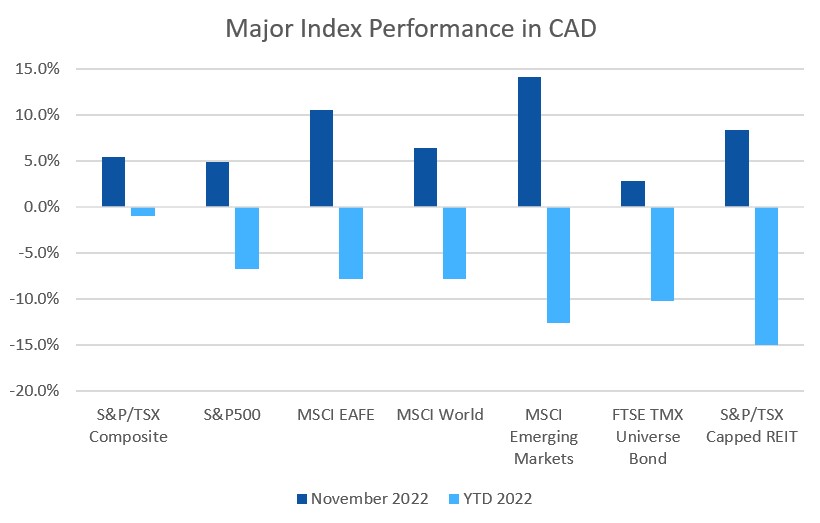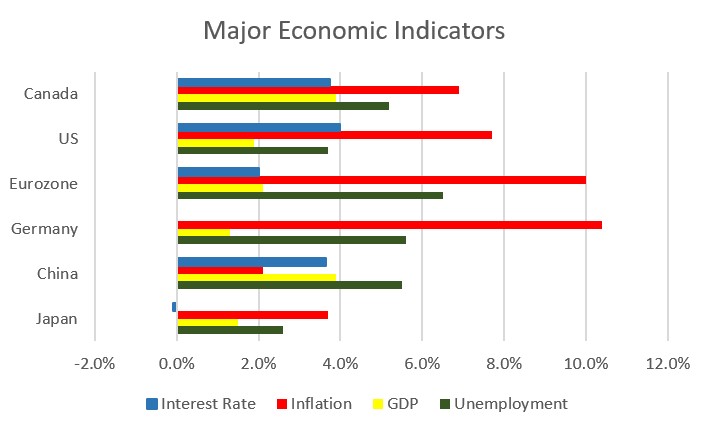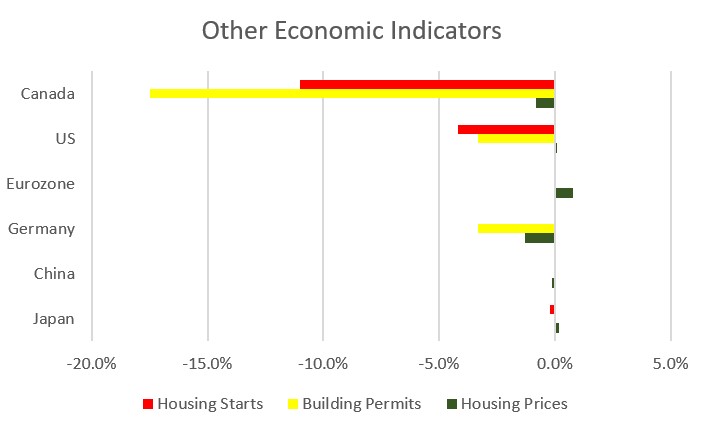November was another good month for equity markets, and a good one for fixed income markets as well.
November 2022 Market Performance
All index returns are total return (includes reinvestment of dividends) and are in Canadian Dollars unless noted.
| Other Market Data | Month-end Value | Return for November 2022 | 2022 YTD Return |
|---|---|---|---|
| Oil Price (USD) | $80.56 | -6.90% | +7.11% |
| Gold Price (USD) | $1,753.20 | +6.86% | -4.12% |
| US 3 month T-bill | +4.37% | +0.15%* | +4.57%* |
| US 10 year Bond | +3.68% | -0.42%* | +2.16%* |
| USD/CAD FX rate | 1.3508 | -1.03% | +6.55% |
| EUR/CAD FX rate | 1.3992 | +3.63% | -2.77% |
| CBOE Volatility Index (VIX) | 20.58 | -20.48% | +19.51% |
*Absolute change in yield, not the return from holding the security.
November was another good month for equity markets, and a good one for fixed income markets as well.
The main index of Canadian stocks, the S&P/TSX Composite, had a good month, rising +5.6%. That brings the year to date within a stones throw of positive territory at -1.0%. The S&P/TSX Small Cap was up +6.2% in November. US markets were also strong: the large cap S&P500 gained +5.6% (in USD), but it’s still down -13.1% for 2022; a loss unlikely to be recovered before the end of December. The index of US small cap stocks, the Russell 2000 gained +2.2%, and the tech focused Nasdaq gained +4.4%. The Nasdaq is still down -26.7% for 2022, keeping it on track for its worst year since the 2008 financial crisis.
The broad index of EAFE stocks (Europe, Australasia & Far East) gained +6.3% in November, halving the YTD loss to -6.7%. Out of the EAFE regions, European stocks performed a little better at +6.8%. Despite all of the turmoil in the UK following Brexit and turnover in the prime minster’s office, British stocks have weathered 2022 very well, gaining +6.7% in November and turning positive for 2022 at +2.6%. Japanese stocks gained +1.4% for the month, while emerging market stocks were hot, gaining +11.5%.
Bonds performed well in November, with both investment grade and high yield performing well.
The major Canadian bond index, the FTSE/TMX Universe Bond Index gained +2.8% in November, while the FTSE/TMX Short-term Bond Index gained +0.9%. In the US, investment grade and high yield bonds were both positive. The investment grade ICE BoA AAA index gained +5.5%, and the BBB index gained +5.1%; both are still down more than -15% for 2022 though. High yield bonds gained +1.9% in November for the HY Master II Index, while the CCC and lower (the real junky stuff) Index was flat.
Canadian REITs gained +8.4% in November, but remain down -15.0% for 2022.
Oil continued its slide, losing -6.9% in November, getting close to US$80 per barrel again. Gold gained +6.9% for the month. The diversified Bloomberg Commodities Index gained +2.4%, its still the only index we track that is up more than +10% in 2022, gaining +17.0% so far this year.
The Canadian Dollar (CAD) gained +1.0% against the US Dollar, but declined -3.6% against the Euro in November.
November 2022 Economic Indicator Recap
Below are the readings released in November for the major economic indicators: central bank interest rates, inflation, GDP and unemployment.
Below are the current readings on the housing market.
A Closer Look at the Canadian Economy
The Canadian labour market remains tight with many businesses having difficulty attracting interest in their open positions. Canada’s unemployment rate remained steady at 5.2% in October. The economy gained 108,300 jobs, well above the expected 10,000. All of the gains were in full time employment. At the sector level, gains were seen in construction, manufacturing, and hospitality.
Higher interest rates are having an effect on housing prices across Canada; the Teranet index posted its 4th negative month in a row. 9 of 11 major markets posted declines, with the largest declines in Halifax (-4.7%), Hamilton (-2.8%), and Winnipeg (-2.4%). Outside of the major cities, the 3 largest decliners were all in Ontario. The only gainers were Calgary (+1.8%) and Edmonton (+2.0%). The annual national price gain for the 12 months ended September 30 was +4.9%, a far cry from +35% gains we were seeing 6 months ago!
The level of new housing starts declined -11% in October to 267,000, making the strong showing in September an outlier. Urban multifamily housing (condos and townhouses) accounted for most of that (245,000). The value of building permits issued sunk -17.5% in September, much worse than market expectations of -6.1%, and the worst report since the start of the pandemic in March 2020. Both residential and non-residential sectors posted double digit declines.
The inflation rate for October was +0.7%, and +6.9% on an annual basis; inflation could decline by 2% and still be higher than inflation at any point in the last 25 years. Transportation costs rose as an OPEC production cut pushed gasoline process higher. Housing costs also rose as interest rate hikes by the bank of Canada drove up mortgage costs. Meanwhile, food prices increased to a level not seen since 1981, exceeding +10%. Core inflation which excludes more variable items such as gasoline, natural gas, fruit & vegetables and mortgage interest was +5.8%. While the Bank of Canada has raised interest rates 6 times so far in 2022, it generally takes at least 12 months for interest rate increases to affect the economy – so don’t expect any major relief in inflation until well into 2023.
Canada’s GDP was up +0.1% in September (the same slight growth for 5 months in a row), with 14 of 20 industrial sectors posting gains. This time goods producing sectors led the way, as they gained +0.3%, while the services sector was flat.
*Sources: MSCI, FTSE, Morningstar Direct, Trading Economics



